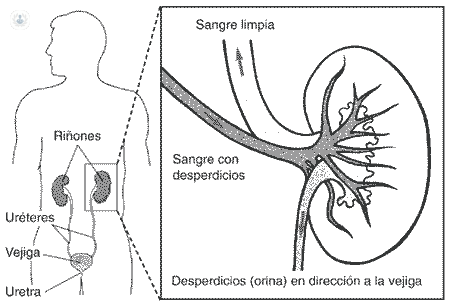Kidney cancer affects men between 50 and 70 years
Written by:Kidney cancer, also known as renal cancer primarily affects men between 50 and 70 years. The most common risk factors for this cancer include smoking, genetics and hemodialysis.
 Kidney cancer ranks third in frequency in urological tumors and represents approximately 3% of all tumors of the body. Urology Specialists say that the symptoms of kidney cancer include, among others, the appearance of blood in the urine (hematuria), pain in the flank and appearance of an abdominal mass.
Kidney cancer ranks third in frequency in urological tumors and represents approximately 3% of all tumors of the body. Urology Specialists say that the symptoms of kidney cancer include, among others, the appearance of blood in the urine (hematuria), pain in the flank and appearance of an abdominal mass.
Diagnosing kidney cancer
Currently, over a third of cases of kidney cancer are detected by performing an imaging test for some other reason. In these cases, the tumor is located and the prognosis is better than in other cases. Renal cell carcinoma is the most common type of kidney cancer, accounting for over 90% of malignant kidney tumors. Approximately 80% of people with renal cell carcinoma has a clear cell carcinoma.
To diagnose a case of kidney cancer must perform a detailed medical history with a thorough physical examination. Then, a blood and a urine is performed in addition to an ultrasound to identify the renal mass. To complete the study is necessary to perform a CT scan to assess the extent of the tumor and the presence of metastasis. Specialists in Urology claim that approximately 30% of patients have metastases at diagnosis.
Treatment for kidney cancer
Surgery is the treatment for kidney tumors lesson, since these tumors do not respond to chemotherapy or radiotherapy. If the tumor is located and has a size less than 4cm, partial kidney resection is performed. In cases where this is not possible, a kidney removal, known as radical nephrectomy.
Rilon monitoring of cancer is done through an abdominal CT scan or ultrasound, or has practiced surgery. The forecast concludes that the survival rate at 5 years according to the American Joint Committee on Cancer (AJCC) is 81% stage I, 74% stage II, 53% stage III, 8% stage IV.


